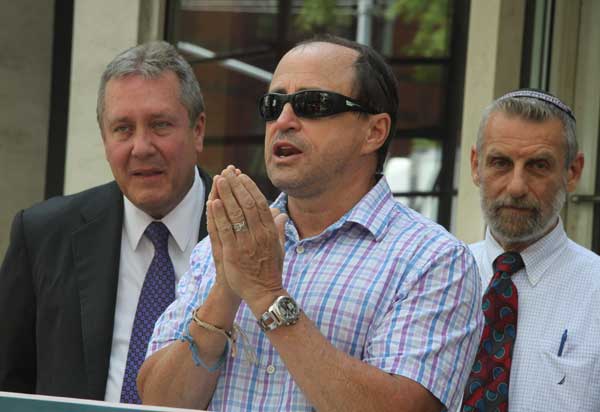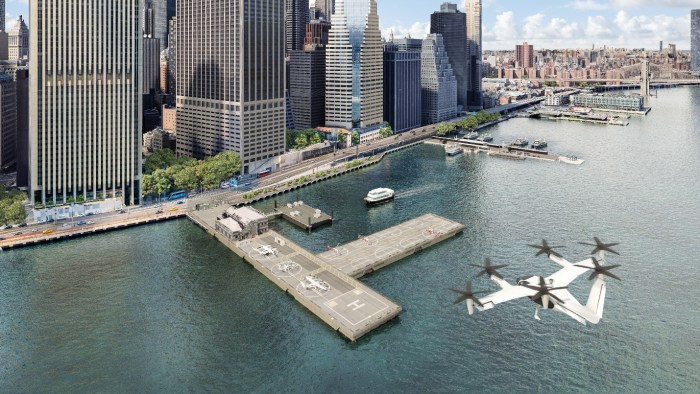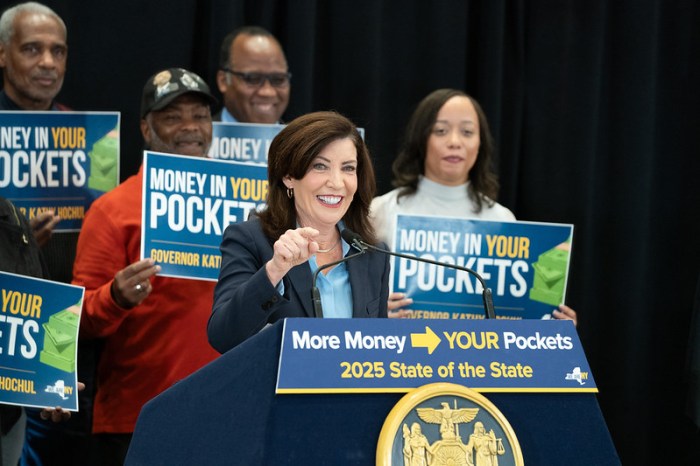
BY DUNCAN OSBORNE | After the city’s Landmarks Preservation Commission refused to landmark a Spring St. building that was home to early gay rights leaders in New York City, openly gay elected officials and longtime L.G.B.T. activists gathered outside the building last week to denounce the decision.
“I question their integrity and their lack of respect for our history,” said Allen Roskoff, the president of the Jim Owles Liberal Democratic Club, at a Wed., Aug. 22, press conference held outside 186 Spring St.
Beginning in the early 1970s and into the early ’80s, the building, constructed in 1824, was, at various times, home to Jim Owles, who was Roskoff’s partner, as well as to Arnie Kantrowitz and Bruce Voeller. Other leading gay political figures are known to have spent time in the building.
Owles, who died in 1993, was a founder of the Gay Activists Alliance (G.A.A.), an early political group, the Gay and Lesbian Alliance Against Defamation (GLAAD), and the Gay & Lesbian Independent Democrats (GLID), a political club. His 1973 run for City Council made Owles the first openly gay candidate to run for political office in New York. Kantrowitz, now 71, was a G.A.A. officer and a GLAAD founder.
Voeller, who died in 1994, was a founder of what is now the National Gay and Lesbian Task Force. He ran the group from 1973 to 1978. He was also in the leadership of the gay community’s response to AIDS.
“This is a history that we should be honoring,” said Andrew Berman, executive director of the Greenwich Village Society for Historic Preservation, which has led the fight to save the building. “This is a history we should be protecting.”
In 2006, G.V.S.H.P. asked that a large part of the South Village be designated a historic district. Only about one-third of that proposed area has, in fact, since been landmarked, with 186 Spring St. in the unprotected section.
On Aug. 15, the L.P.C. wrote to Berman saying, “Although the events and figures associated with 186 Spring Street are historically significant, the building lacks the requisite architectural integrity to warrant recommending 186 Spring Street to the full commission for consideration as an individual landmark.”
Nordica Development wants to build “luxury loft-style condominiums” on the site, and would demolish 186 Spring St. for the project.
“It was an integral part of the gay rights movement,” said Tom Duane, the openly gay state senator whose Manhattan district runs from Canal St. to the Upper West Side and comes within a block of the Spring St. building. “There would be no Tom Duane elected to anything if not for the people who lived in this building,” he said.
Duane was the first openly gay person elected to the City Council and to the state Senate. A host of other elected officials and gay groups have written the L.P.C. asking it to preserve the building.
Openly gay City Councilmember Daniel Dromm, who represents part of Queens, said that too many people in the queer community did not know their own community’s history or its early leaders.
“Most people in the L.G.B.T. movement don’t even know who they are,” Dromm said. “That’s why we must preserve this building.”
The Firehouse, G.A.A.’s Wooster St. headquarters, was roughly two blocks away, so it was not uncommon for G.A.A. members to stop by the Spring St. building after political or social events at the Firehouse.
“It was here…that all of the early leaders resided,” said Steve Ashkinazy, a member of the Stonewall Democratic Club of New York City, who spent time in the house.
The city has not noted or protected any building or other location expressly because of its place in queer community history, according to Berman.
“In the entire city of New York, there is not a single site that the city has recognized because of its importance to L.G.B.T. history,” he said.
The Stonewall Inn bar on Christopher St. — the site of the 1969 riots seen as launching the modern gay rights movement — is a state and federal landmark, but New York City has not protected it.
The L.P.C. did not respond to e-mails seeking comment. Reached by phone by this reporter, Stéphane Boivin, Nordica’s president, said he was occupied and could not speak.


































